大学英语精读第三版第二册U4教案
大学体验英语综合教程2 第三版 Unit 4 电子教案
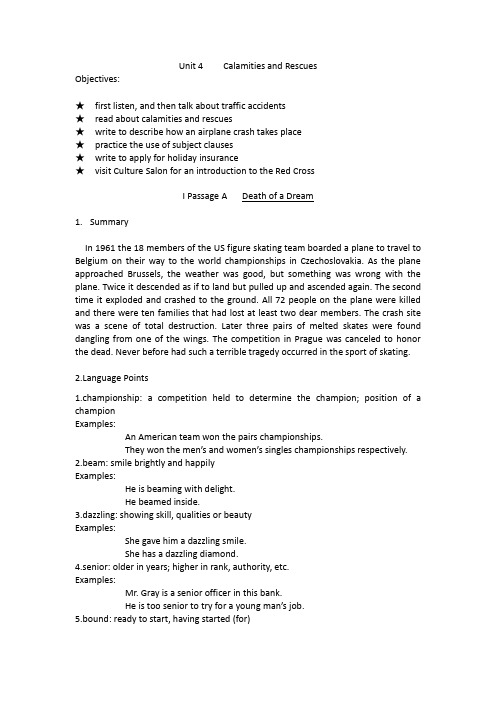
Unit 4Calamities and RescuesObjectives:★first listen, and then talk about traffic accidents★read about calamities and rescues★write to describe how an airplane crash takes place★practice the use of subject clauses★write to apply for holiday insurance★visit Culture Salon for an introduction to the Red CrossI Passage A Death of a Dream1.SummaryIn 1961 the 18 members of the US figure skating team boarded a plane to travel to Belgium on their way to the world championships in Czechoslovakia. As the plane approached Brussels, the weather was good, but something was wrong with the plane. Twice it descended as if to land but pulled up and ascended again. The second time it exploded and crashed to the ground. All 72 people on the plane were killed and there were ten families that had lost at least two dear members. The crash site was a scene of total destruction. Later three pairs of melted skates were found dangling from one of the wings. The competition in Prague was canceled to honor the dead. Never before had such a terrible tragedy occurred in the sport of skating.nguage Points1.championship: a competition held to determine the champion; position of a championExamples:An American team won the pairs championships.They won the men’s and women’s singles championships respectively. 2.beam: smile brightly and happilyExamples:He is beaming with delight.He beamed inside.3.dazzling: showing skill, qualities or beautyExamples:She gave him a dazzling smile.She has a dazzling diamond.4.senior: older in years; higher in rank, authority, etc.Examples:Mr. Gray is a senior officer in this bank.He is too senior to try for a young man’s job.5.bound: ready to start, having started (for)They were on the New York express, bound for Maine.That ship is bound for South America.6.distress: a state of danger or great difficultyExamples:If the storm continues on the mountain, the climber will be in distress by morning.The lifeboat went out to rescue a ship in distress.7.signal:(n.) something intended to warn, command, or give a messageExamples:A red light is often used as a danger signal.American Indians used to occasionally send smoke signals.(v.) send a signal or signals toExamples:The general signaled to his officers for the attack to begin.She was signaling wildly, waving her arms.8.contact: get in touch with somebodyExamples:I shall contact you by telephone.I must contact my lawyer before I make my fi nal decisions.9.lower: move or let down in heightExamples:Lowering the window shade will keep out the sun.He sat quite still, with his gaze lowered to the carpet.10.approach:(n.) movement towards or near to somethingExamples:Our approach drove away the wild animals.With the approach of the Spring Festival the weather turned cold. (v.) come near or nearerExamples:Walk softly as you approach the bed.I saw a figure approaching towards me.11.collision: an accident in which two or more people or vehicles hit each other while moving in different directionsExamples:The liner is reported to have had a collision with an oil tanker.The two cars were broken into pieces in the collision.12.in any case: whatever happensExamples:In any case, I shall return in a day or two.In any case, I would insist upon your being paid.(n.) a violent vehicle accidentExamples:There have been a lot of crashes lately.All the passengers were killed in the plane crash.(v.) fall or strike suddenly, violently and noisilyExamples:I heard the dinner tray crash to the floor.Standing on the beach, I could hear the waves crashing against the rocks.14.rear: raise; lift upExamples:A lion suddenly reared its head from among the tall grass.The skyscraper rears above the neighboring buildings.15. explode: burst or cause to burst violently and noisilyExamples:The boiler exploded and many people were injured by the hot steam.He pumped the ball up too much and it exploded.16. scatter: separate or cause to separate widelyExamples:A flock of birds scattered when the shot was fired.The government scattered the factories instead of concentrating them ina single area.17.stun: shock into helplessnessExamples:He was stunned by the unfairness of their judgment.She was stunned by the news of her fat her’s death18.tragic: very sad; unfortunateExamples:The tragic accident took eight lives.The driver of the car made a tragic mistake.b through: search something thoroughlyExamples:The students spent many hours in the library, combing through old books looking for facts they wanted.He combed through the files searching for evidence of fraud.20.wreckage: the broken parts of a destroyed thingExamples:After the accident, the wreckage of the cars was removed from the highway.The shore was covered with the wreckage of the destroyed ship1.championship: a competition held to determine the champion; position of a championAn American team won the pairs championships.They won the men’s and women’s singles championships respectively. 2.beam: smile brightly and happilyExamples:He is beaming with delight.He beamed inside.3.dazzling: showing skill, qualities or beautyExamples:She gave him a dazzling smile.She has a dazzling diamond.4.senior: older in years; higher in rank, authority, etc.Examples:Mr. Gray is a senior officer in this bank.He is too senior to try for a young man’s job.5.bound: ready to start, having started (for)Examples:They were on the New York express, bound for Maine.That ship is bound for South America.6.distress: a state of danger or great difficultyExamples:If the storm continues on the mountain, the climber will be in distress by morning.The lifeboat went out to rescue a ship in distress.7.signal:(n.) something intended to warn, command, or give a messageExamples:A red light is often used as a danger signal.American Indians used to occasionally send smoke signals.(v.) send a signal or signals toExamples:The general signaled to his officers for the attack to begin.She was signaling wildly, waving her arms.8.contact: get in touch with somebodyExamples:I shall contact you by telephone.I must contact my lawyer before I make my fi nal decisions.9.lower: move or let down in heightExamples:Lowering the window shade will keep out the sun.He sat quite still, with his gaze lowered to the carpet.10.approach:(n.) movement towards or near to somethingOur approach drove away the wild animals.With the approach of the Spring Festival the weather turned cold. (v.) come near or nearerExamples:Walk softly as you approach the bed.I saw a figure approaching towards me.11.collision: an accident in which two or more people or vehicles hit each other while moving in different directionsExamples:The liner is reported to have had a collision with an oil tanker.The two cars were broken into pieces in the collision.12.in any case: whatever happensExamples:In any case, I shall return in a day or two.In any case, I would insist upon your being paid.13.crash:(n.) a violent vehicle accidentExamples:There have been a lot of crashes lately.All the passengers were killed in the plane crash.(v.) fall or strike suddenly, violently and noisilyExamples:I heard the dinner tray crash to the floor.Standing on the beach, I could hear the waves crashing against the rocks.14.rear: raise; lift upExamples:A lion suddenly reared its head from among the tall grass.The skyscraper rears above the neighboring buildings.15. explode: burst or cause to burst violently and noisilyExamples:The boiler exploded and many people were injured by the hot steam.He pumped the ball up too much and it exploded.16. scatter: separate or cause to separate widelyExamples:A flock of birds scattered when the shot was fired.The government scattered the factories instead of concentrating them ina single area.17.stun: shock into helplessnessExamples:He was stunned by the unfairness of their judgment.She was stunned by the news of her father’s death18.tragic: very sad; unfortunateThe tragic accident took eight lives.The driver of the car made a tragic mistake.b through: search something thoroughlyExamples:The students spent many hours in the library, combing through old books looking for facts they wanted.He combed through the files searching for evidence of fraud.20.wreckage: the broken parts of a destroyed thingExamples:After the accident, the wreckage of the cars was removed from the highway.The shore was covered with the wreckage of the destroyed ship3.Important sentences1. This was going to be the time of their lives.This was going to be their most important and memorable experience.2. The crash site was a scene of total destruction.The place where the plane crashed was completely covered with wreckage.3. The crash stunned skaters and figure skating fans around the globe.The crash shocked figure skaters and their fans everywhere in the world.4. All that remained as rescuers combed through the wreckage were three pairs of melted skates dangling from one of the wings.When rescue workers carefully looked through the wreckage, the only things they found (to remind them of the skaters) were three pairs of melted skates suspended from one of the wings.II Passage B In the Nick of Time1.SummaryAs Katie Pritchard unloaded some groceries from her car, she thought her two sons were playing safely nearby. But they had wandered onto a railroad track and into the path of an approaching train. The train’s engineer and its conductor saw them on the track but could not stop t he train in time. The boys ignored the train’s whistling horn and screeching brakes. So the conductor, Tony Falzo, a former gymnast, hung from the front of the train, jumped at exactly the right moment, and rescued the two boys from the moving train, which barely missed crushing them before it finally stopped. One of the boys had a minor cut and the other was unharmed. The mother said she could find no word in a dictionary to express her gratitude to Tony. nguage Points1.unload: remove (a load) from (something)Examples:They unloaded the books from the car.The plane unloaded the passengers at the terminal.2.wander: move about without aim or purposeExamples:After tea I wandered alone about the town.What peculiar pleasure it is to wander through a strange city.3.cluster: a number of things of the same kind growing or being close together in a groupExamples:Many flowers grow in clusters.Here and there in the suburbs are newly built houses in clusters.4.put away: place something tidilyExamples:The letters were all put away in numbered files.If you have finished with those tools, I wish you’d put them away.5.roar: a deep loud continuing soundExamples:She was frightened by the lion’s roars.The roar of airplane engines announced a coming air aid.6.kneel: go down or remain on the knee(s)Examples:She knelt down to pull a weed from flower-bed.He went into the church, knelt (down) and began to pray.7.head for: move towardExamples:—“Where are you heading for?”—“I’m heading for London.”It’s not clear how many of them will be heading for Shang hai.8.slam: push, move hurriedly and with great forceExamples:He slammed the book down on the table and angrily walked out.She slammed on the brakes and the car came to a stop.9.steer: direct the course of (as a ship or vehicle)Examples:He steered the car skillfully through the narrow streets.He steered the boat between the islands.10.screech: a harsh, piercing soundExamples:The girl’s screeches brought the police.The forest seemed full of monkeys’ screeches.11.pound: beat repeatedlyExamples:With a madly pounding heart he took the steps three a time.Her heart began to pound and new life came into her limbs.12.leap: jump overExamples:When the bus slowed down the man leaped off.He leaped six meters in the broad jump.13.scoop: take up or outExamples:He scooped his books off the floor.She scooped the baby up in her arms and ran from the flame.14.crush: press with great force so as to break, hurtExamples:Don’t crush this box; there are flowers inside.Several people were crushed to death as they tried to escape from the burning theater.15. beneath: belowExamples:They sheltered themselves beneath their umbrellas.She concealed the bottle beneath her mattress.16. instant: a moment of timeExamples:Not for an instant did I believe he had lied.Mr. Carey considered the question for an instant.17.giant: very largeExamples:He bought giant Christmas trees last year.The giant packet gives you more for less money.18.stride: a long step in walkingExamples:In a few strides he crossed the room.He reached the house several strides before us.19.tuck: put into a convenient narrow space for protection, safety, etc. Examples:The bird tucked its head under its wing.Jack tucked a napkin under his chin.20.perch: (cause to) go into or be in the stated position (especially unsafely, or on something high)Examples:He would take out his spectacles and perch them on the end of his nose.The little village perches high among the hills.21.everlasting: lasting for ever; endlessExamples:What is the key to everlasting happiness?Their contributions to science have earned them an everlasting place in history.22.appreciation: grateful feelingExamples:He showed no appreciation of my help.How can we express our appreciation for your help?3.Sentence Explanation1. Just over a slight rise to the west, a 19-car freight train slowly made its way up the incline.On the other side of a small hill to the west, a 19-car freight train slowly climbed up the slope.2. Falzo knew right away that the train was going too fast to stop in time.Falzo quickly realized that the train was going too fast to stop before it hit the children.3. ... Falzo knew he couldn’t outrun it....Falzo knew he couldn’t run faster than the train.4. With one child tucked under each arm, he pressed Todd and Scott down into the roadbed gravel.He held the two kids one under each arm and pushed them down into the roadbed gravel between the rail tracks1. This list goes on, and it is expanding every day.he list of different kinds of advertisements is very long, and it is getting longer and longer.2. Without them acting as sponsors we would not be able to stage international sporting events.Large companies provide the necessary financial support needed for international sporting events, and in return they get to advertise their products at these sporting events.3. As useful as it is, advertisements are sometimes abused by unscrupulous people.Although advertisements have many advantages, some people use them in a dishonest way, usually for a bad purpose.4. Yet these advertisers blatantly ignore facts and promote their products nonetheless.Though these advertisers are consciously aware of the harm of smoking, they choose to overlook the obvious facts and keep on advertising cigarettes.5. Besides giving us a mental jolt they methodically numb and abuse our minds until we watch them without actually seeing and hear their chatter without actually listening.Not only do advertisements surprise us and distract us from the middle of an exciting program, they also attack us mentally to such an extent that we simply feel we don’t see or hear anything when the same advertisements are being repeated.6. Presently advertisement on television is based on hard-selling and relentless assault on the viewers.Now advertisers usually promote their products by putting viewers under extreme psychological pressure and attacking them with repetitive advertising of the same prodIII General Writing: Subject ClausesSubject clauses, which are introduced by that, what, why, whether, who, which, how and so on, are dependent clauses used as a subject in a complex sentence. Example: What you intend to do is interesting.。
大学英语精读第三版第二册教案

教学目标:1. 通过阅读课文,掌握文章的基本内容和结构。
2. 培养学生阅读理解能力和英语表达能力。
3. 提高学生的词汇量和语法水平。
4. 培养学生自主学习和合作学习的习惯。
教学重点:1. 课文主要内容和结构。
2. 课文中的重点词汇和短语。
3. 课文的语法结构。
教学难点:1. 课文中的长难句理解。
2. 课文中抽象概念的理解。
3. 课文中的词汇和短语运用。
教学工具:1. 多媒体课件2. 课文原文3. 生词表4. 语法讲解资料教学过程:一、导入1. 教师简要介绍课文背景,激发学生的学习兴趣。
2. 引导学生思考课文可能涉及的主题和内容。
二、课文阅读1. 学生自读课文,初步了解文章大意。
2. 教师提问,检查学生对课文内容的理解。
3. 学生分组讨论,进一步分析课文结构。
三、词汇学习1. 教师讲解课文中的重点词汇和短语,提供例句。
2. 学生跟读并模仿例句,巩固词汇。
3. 学生完成词汇练习,检验学习效果。
四、语法讲解1. 教师讲解课文中的语法结构,结合例句进行讲解。
2. 学生跟读并模仿例句,巩固语法知识。
3. 学生完成语法练习,检验学习效果。
五、课文翻译1. 学生分组进行课文翻译,相互检查和纠正。
2. 教师选取部分段落进行点评和讲解。
六、课堂小结1. 教师总结本节课的重点内容和难点,强调学习要点。
2. 学生分享学习心得,提出疑问。
七、课后作业1. 学生完成课后阅读练习。
2. 学生翻译课文中的长难句。
3. 学生预习下一节课内容。
教学反思:1. 教师应根据学生的学习情况,调整教学方法和手段,提高教学效果。
2. 鼓励学生积极参与课堂活动,培养学生的自主学习能力。
3. 关注学生的学习进度,及时调整教学计划,确保教学目标的实现。
教学课时:2课时备注:本教案仅供参考,教师可根据实际情况进行调整。
(完整版)新视野大学英语第三版第二册第四课教案
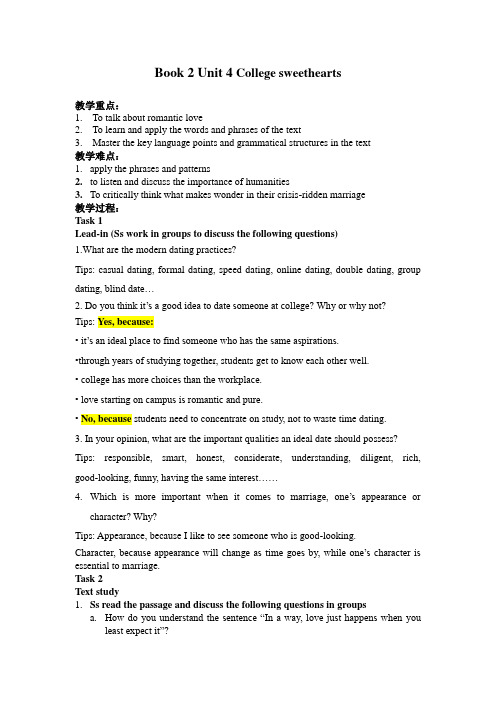
Book 2 Unit 4 College sweethearts教学重点:1.To talk about romantic love2.To learn and apply the words and phrases of the text3.Master the key language points and grammatical structures in the text教学难点:1.apply the phrases and patterns2.to listen and discuss the importance of humanities3.To critically think what makes wonder in their crisis-ridden marriage教学过程:Task 1Lead-in (Ss work in groups to discuss the following questions)1.What are the modern dating practices?Tips: casual dating, formal dating, speed dating, online dating, double dating, group dating, blind date…2. Do you think it’s a good idea to date someone at college? Why or why not?Tips: Yes, because:• it’s an ideal place to find someone who has the same aspirations.•through years of studying to gether, students get to know each other well.• college has more choices than the workplace.• love starting on campus is romantic and pure.• No, because students need to concentrate on study, not to waste time dating.3. In your opinion, what are the important qualities an ideal date should possess? Tips: responsible, smart, honest, considerate, understanding, diligent, rich, good-looking, funny, having the same interest……4.Which is more important when it comes to marriage, one’s appearance orcharacter? Why?Tips: Appearance, because I like to see someone who is good-looking. Character, because appearance will change as time goes by, while one’s character is essential to marriage.Task 2Text study1.Ss read the passage and discuss the following questions in groupsa.How do you understand the sentence “In a way, love just happens when youleast expect it”?b.Why did the author think that Butch seemed a little weired although very cute?c.Why did fear come over the author whem she started to fall in love?nguage focus1) New words: gaze, dynamic, proceed, coordinate, confess, commence,disapprove, tempt, deserve2) Phrasesa. Sth.(a feeling) comes over sb. when sb. does sth.用于表达“某人在特定情境下突然受到某种情感的影响”。
大学生英语精读2教案
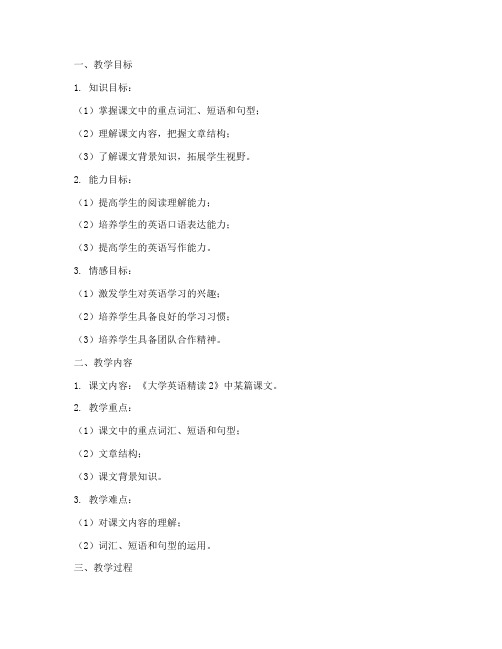
一、教学目标1. 知识目标:(1)掌握课文中的重点词汇、短语和句型;(2)理解课文内容,把握文章结构;(3)了解课文背景知识,拓展学生视野。
2. 能力目标:(1)提高学生的阅读理解能力;(2)培养学生的英语口语表达能力;(3)提高学生的英语写作能力。
3. 情感目标:(1)激发学生对英语学习的兴趣;(2)培养学生具备良好的学习习惯;(3)培养学生具备团队合作精神。
二、教学内容1. 课文内容:《大学英语精读2》中某篇课文。
2. 教学重点:(1)课文中的重点词汇、短语和句型;(2)文章结构;(3)课文背景知识。
3. 教学难点:(1)对课文内容的理解;(2)词汇、短语和句型的运用。
三、教学过程1. 导入(5分钟)(1)教师简要介绍课文背景,激发学生兴趣;(2)提问:What do you think about the topic of this text?2. 预习(10分钟)(1)学生快速阅读课文,了解大意;(2)教师检查学生预习情况,解答学生疑问。
3. 精读(20分钟)(1)教师带领学生分析课文结构,讲解重点词汇、短语和句型;(2)学生跟读课文,模仿语音、语调;(3)分组讨论课文内容,分享学习心得。
4. 口语练习(15分钟)(1)学生根据课文内容进行角色扮演;(2)教师纠正学生发音、语调等方面的错误;(3)学生自由发言,提高口语表达能力。
5. 写作练习(10分钟)(1)教师给出写作题目,学生进行写作;(2)教师点评学生作文,指出优点和不足。
6. 总结(5分钟)(1)教师总结本节课所学内容;(2)布置课后作业,巩固所学知识。
四、课后作业1. 阅读课文,熟记重点词汇、短语和句型;2. 查找课文背景资料,拓展知识面;3. 完成课后写作练习,提高写作能力。
五、教学反思本节课通过精读、口语练习和写作练习,帮助学生掌握课文内容,提高英语阅读、口语和写作能力。
在教学过程中,教师应注重培养学生的团队合作精神,激发学生对英语学习的兴趣,养成良好的学习习惯。
大学英语精读第三版第二册教案_Unit4
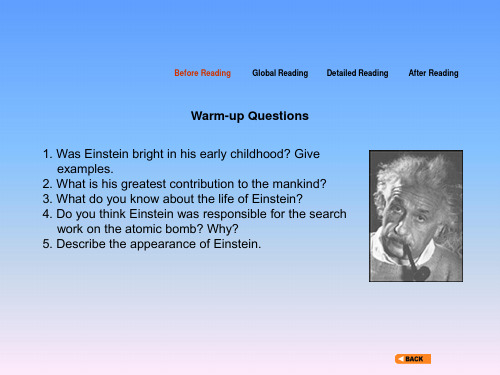
Died in hospital in Princeton.
Before Reading
Global Reading Detailed Reading
After Reading
1. A brief introduction
In 1905 Einstein received his doctorate from the University of Zurich for a theoretical dissertation on the dimensions of molecules, and he also published three theoretical papers of central importance to the development of 20thcentury physics.
■
Before Reading
Global Reading Detailed Reading
After Reading
When Hitler came to power, Einstein immediately decided to leave Germany for the United States. He took a position at the Institute for Advanced Study at Princeton, New Jersey. In 1939 Einstein collaborated with several other physicists in writing a letter to President Franklin D. Roosevelt, pointing out the possibility of making an atomic bomb and the likelihood that the German government was embarking on such a course. The letter, which bore only Einstein’s signature, helped lend urgency to efforts in the U.S. to build the atomic bomb, but Einstein himself played no role in the work and knew nothing about it at the time.
大学英语读写2第三版unit4教案

一、教学目标1. 让学生了解旅游的意外目的,培养学生的阅读和写作能力;2. 通过本单元的学习,使学生能够运用英语谈论旅游的意外目的,并能将所学知识运用到实际生活中;3. 提高学生的词汇、语法、句型和篇章结构等方面的综合运用能力。
二、教学内容Unit 4: The Surprising Purpose of Travel三、教学重点与难点1. 教学重点:理解文章主旨,掌握文章结构,学习并运用相关词汇和句型;2. 教学难点:把握文章主旨,理解作者观点,提高阅读速度和理解能力。
四、教学过程1. 导入新课(1)播放一段关于旅游的短视频,激发学生的学习兴趣;(2)引导学生思考:旅游的真正目的是什么?2. 预习课文(1)学生快速阅读课文,了解文章大意;(2)教师提问,检查学生的预习效果。
3. 课文讲解(1)分析文章结构,讲解文章主旨;(2)分析作者观点,引导学生思考;(3)讲解相关词汇和句型,提高学生的词汇和语法水平。
4. 课堂活动(1)小组讨论:结合自身经历,谈谈旅游的意外目的;(2)角色扮演:模拟旅游场景,运用所学知识进行对话;(3)写作训练:以“旅游的意外目的”为主题,写一篇短文。
5. 课堂小结(1)回顾本节课所学内容,总结重点和难点;(2)布置课后作业,巩固所学知识。
五、教学评价1. 课堂表现:观察学生在课堂上的参与度、积极性;2. 预习效果:检查学生的预习情况,了解学生对课文内容的掌握程度;3. 课堂活动:评估学生在课堂活动中的表现,如小组讨论、角色扮演等;4. 课后作业:检查学生的写作练习,了解学生的写作水平。
六、教学反思1. 教师应关注学生的个体差异,因材施教;2. 采用多种教学方法,激发学生的学习兴趣;3. 注重培养学生的阅读和写作能力,提高学生的英语综合素养。
新视野大学英语第三版第二册Unit4教案

课程名称:新视野大学英语第三版第二册单元主题:What’s the big idea?教学目标:1. 培养学生运用语音、体态语言和视觉辅助工具进行有效演讲的能力。
2. 提高学生的听力理解能力,学会预测听力材料主题和关键词汇。
3. 增强学生的口语表达能力,学会在头脑风暴中提出观点并评论他人观点。
4. 培养学生谈论发明和创新思维的能力。
5. 让学生能够清晰、流畅地表达自己的商业想法。
教学重点:1. 语音、体态语言和视觉辅助工具在演讲中的运用。
2. 听力理解技巧,包括预测主题和关键词汇。
3. 口语表达技巧,包括头脑风暴和评论他人观点。
4. 发明和创新思维的探讨。
5. 商业想法的表达。
教学难点:1. 语音、体态语言和视觉辅助工具在演讲中的综合运用。
2. 听力理解中关键词汇的预测和把握。
3. 口语表达中的逻辑性和连贯性。
4. 商业想法的清晰性和说服力。
教学方法:1. 案例分析法:通过分析优秀演讲案例,引导学生掌握演讲技巧。
2. 小组讨论法:让学生在小组内进行头脑风暴,提出观点并评论他人观点。
3. 角色扮演法:让学生扮演不同角色,模拟实际场景,提高口语表达能力。
4. 任务驱动法:通过设计具体任务,引导学生运用所学知识进行实践。
教学步骤:一、导入1. 教师展示一些世界最差发明图片,引导学生讨论为什么这些发明被列入“世界最差发明”名单。
2. 引出单元主题:What’s the big idea?(什么是个大想法?)二、新课导入1. 学生阅读课文,了解单元主题和相关词汇。
2. 教师讲解重点词汇和语法结构。
3. 学生进行词汇和语法练习。
三、听力训练1. 学生听录音,预测听力材料主题和关键词汇。
2. 学生听录音,回答问题,检验听力理解能力。
3. 教师讲解听力材料,分析关键词汇和句子结构。
四、口语表达训练1. 学生进行头脑风暴,提出关于发明的创意想法。
2. 学生分组讨论,评论他人观点,并提出自己的看法。
3. 学生进行角色扮演,模拟实际场景,提高口语表达能力。
新视野大学英语第三版第二册第四课教案
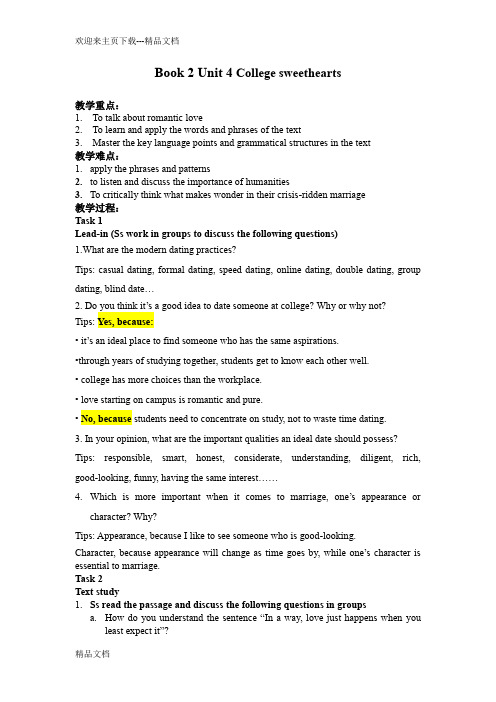
Book 2 Unit 4 College sweethearts教学重点:1.To talk about romantic love2.To learn and apply the words and phrases of the text3.Master the key language points and grammatical structures in the text教学难点:1.apply the phrases and patterns2.to listen and discuss the importance of humanities3.To critically think what makes wonder in their crisis-ridden marriage教学过程:Task 1Lead-in (Ss work in groups to discuss the following questions)1.What are the modern dating practices?Tips: casual dating, formal dating, speed dating, online dating, double dating, group dating, blind date…2. Do you think it’s a good idea to date someone at college? Why or why not?Tips: Yes, because:• it’s an ideal place to find someone who has the same aspirations.•through years of studying to gether, students get to know each other well.• college has more choices than the workplace.• love starting on campus is romantic and pure.• No, because students need to concentrate on study, not to waste time dating.3. In your opinion, what are the important qualities an ideal date should possess? Tips: responsible, smart, honest, considerate, understanding, diligent, rich, good-looking, funny, having the same interest……4.Which is more important when it comes to marriage, one’s appearance orcharacter? Why?Tips: Appearance, because I like to see someone who is good-looking. Character, because appearance will change as time goes by, while one’s character is essential to marriage.Task 2Text study1.Ss read the passage and discuss the following questions in groupsa.How do you understand the sentence “In a way, love just happens when youleast expect it”?b.Why did the author think that Butch seemed a little weired although very cute?c.Why did fear come over the author whem she started to fall in love?nguage focus1) New words: gaze, dynamic, proceed, coordinate, confess, commence,disapprove, tempt, deserve2) Phrasesa. Sth.(a feeling) comes over sb. when sb. does sth.用于表达“某人在特定情境下突然受到某种情感的影响”。
新编英语教程2(第三版)第4单元课件

Questions:
1. What are the students doing in the reading room?
They are playing a fantasy board game. 2. What does Lyle want after the game is over? He is tired of his ordinary life and wants to live in the world of fantasy.
新编英语教程(第三版)第二册
Unit 4 Dream Lead-In LSP Dialogue Role-Play L &S Reading Writing Exercises
mortal: You can describe someone as a mortal when you want to say that they are an ordinary person. e.g. Tickets seem unobtainable to the ordinary mortal.
新编英语教程(第三版)第二册
Unit 4 Dream Lead-In LSP Dialogue Role-Play L &S Reading Writing Exercises
Wizards and Warbeasts: name of a fantasy game《巫师 与魔兽》
新编英语教程(第三版)第二册
新编英语教程(第三版)第二册
Unit 4 Dream Lead-In LSP Dialogue Role-Play L &S Reading Writing Exercises
Proteus the Invincible: a Greek sea god capable of assuming different forms. Here Lyle used this name to refer to himself.
新视野大学英语第三版第二册第四单元ection A课件ppt资料讲解

Watch and talk
Pre-reading activities
Watch and talk
1. What love story does Taylor Swift tell in the song? And what do you learn?
• A love story of Romeo and Juliet who met with strong resistance from their parents because of a family feud, but earned a happy ending with their true love and courage to fight against fate.
Pre-reading activities
Compound dictation
Listen to a short passage concerning American dating and fill in the missing information.
Before marriage, younger Americans date each other, that is, they often go out together. Casual dating usually begins in the early teens, and in the late teens a _p_a_tt_e_r_n_ of steady dating develops. There is a great _p_o_s_s_ib_i_li_t_y that one goes to a dance with one person, to a football game with another, and to a picnic with a third.
大学英语精读第三版第二册教案
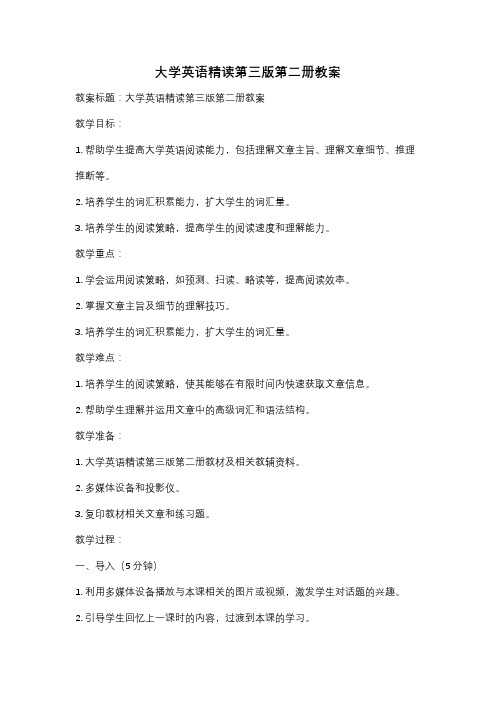
大学英语精读第三版第二册教案教案标题:大学英语精读第三版第二册教案教学目标:1. 帮助学生提高大学英语阅读能力,包括理解文章主旨、理解文章细节、推理推断等。
2. 培养学生的词汇积累能力,扩大学生的词汇量。
3. 培养学生的阅读策略,提高学生的阅读速度和理解能力。
教学重点:1. 学会运用阅读策略,如预测、扫读、略读等,提高阅读效率。
2. 掌握文章主旨及细节的理解技巧。
3. 培养学生的词汇积累能力,扩大学生的词汇量。
教学难点:1. 培养学生的阅读策略,使其能够在有限时间内快速获取文章信息。
2. 帮助学生理解并运用文章中的高级词汇和语法结构。
教学准备:1. 大学英语精读第三版第二册教材及相关教辅资料。
2. 多媒体设备和投影仪。
3. 复印教材相关文章和练习题。
教学过程:一、导入(5分钟)1. 利用多媒体设备播放与本课相关的图片或视频,激发学生对话题的兴趣。
2. 引导学生回忆上一课时的内容,过渡到本课的学习。
二、预习导入(10分钟)1. 让学生自主阅读课文标题、段落标题和图片等,预测文章内容。
2. 鼓励学生提出问题并讨论,激发学生的思考和好奇心。
三、阅读训练(30分钟)1. 分段教学,引导学生通过扫读和略读等阅读策略快速获取文章主旨和细节信息。
2. 针对每个段落的重点句子和难点词汇进行解读和讲解。
3. 组织学生进行小组讨论,分享对文章的理解和感受。
四、词汇拓展(15分钟)1. 教师呈现并讲解本课文章中的重点词汇和短语。
2. 组织学生进行词汇拓展活动,如词义辨析、词汇运用等。
五、语法点讲解(10分钟)1. 教师讲解本课文章中的重点语法结构,并与学生一起进行练习。
2. 引导学生在阅读中注意语法结构的运用和理解。
六、练习与巩固(15分钟)1. 分发练习题,让学生进行阅读理解和语法填空等练习。
2. 引导学生相互检查答案,并进行讲解和讨论。
七、总结与反思(5分钟)1. 教师对本课的教学进行总结,强调重点和难点。
2. 鼓励学生提出问题和反思,促进学生对学习的思考和反思。
新视野大学英语第三版读写教程第二册Unit4-Collegesweethearts课文语法讲解
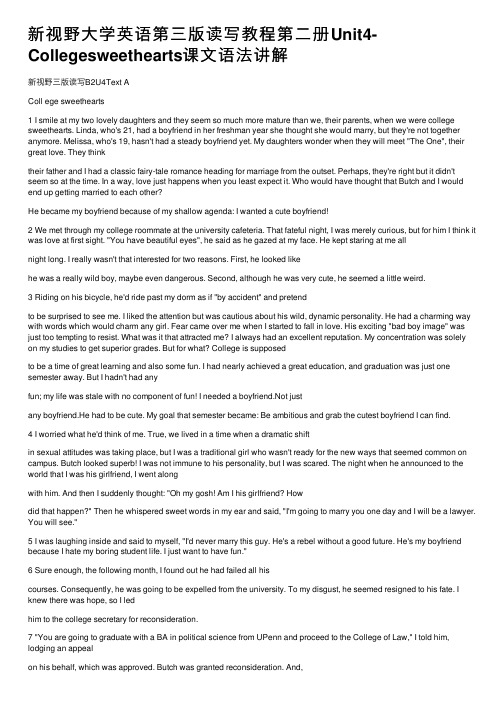
新视野⼤学英语第三版读写教程第⼆册Unit4-Collegesweethearts课⽂语法讲解新视野三版读写B2U4Text AColl ege sweethearts1 I smile at my two lovely daughters and they seem so much more mature than we, their parents, when we were college sweethearts. Linda, who's 21, had a boyfriend in her freshman year she thought she would marry, but they're not together anymore. Melissa, who's 19, hasn't had a steady boyfriend yet. My daughters wonder when they will meet "The One", their great love. They thinktheir father and I had a classic fairy-tale romance heading for marriage from the outset. Perhaps, they're right but it didn't seem so at the time. In a way, love just happens when you least expect it. Who would have thought that Butch and I would end up getting married to each other?He became my boyfriend because of my shallow agenda: I wanted a cute boyfriend!2 We met through my college roommate at the university cafeteria. That fateful night, I was merely curious, but for him I think it was love at first sight. "You have beautiful eyes", he said as he gazed at my face. He kept staring at me allnight long. I really wasn't that interested for two reasons. First, he looked likehe was a really wild boy, maybe even dangerous. Second, although he was very cute, he seemed a little weird.3 Riding on his bicycle, he'd ride past my dorm as if "by accident" and pretendto be surprised to see me. I liked the attention but was cautious about his wild, dynamic personality. He had a charming way with words which would charm any girl. Fear came over me when I started to fall in love. His exciting "bad boy image" was just too tempting to resist. What was it that attracted me? I always had an excellent reputation. My concentration was solely on my studies to get superior grades. But for what? College is supposedto be a time of great learning and also some fun. I had nearly achieved a great education, and graduation was just one semester away. But I hadn't had anyfun; my life was stale with no component of fun! I needed a boyfriend.Not justany boyfriend.He had to be cute. My goal that semester became: Be ambitious and grab the cutest boyfriend I can find.4 I worried what he'd think of me. True, we lived in a time when a dramatic shiftin sexual attitudes was taking place, but I was a traditional girl who wasn't ready for the new ways that seemed common on campus. Butch looked superb! I was not immune to his personality, but I was scared. The night when he announced to the world that I was his girlfriend, I went alongwith him. And then I suddenly thought: "Oh my gosh! Am I his girlfriend? Howdid that happen?" Then he whispered sweet words in my ear and said, "I'm going to marry you one day and I will be a lawyer. You will see."5 I was laughing inside and said to myself, "I'd never marry this guy. He's a rebel without a good future. He's my boyfriend because I hate my boring student life. I just want to have fun."6 Sure enough, the following month, I found out he had failed all hiscourses. Consequently, he was going to be expelled from the university. To my disgust, he seemed resigned to his fate. I knew there was hope, so I ledhim to the college secretary for reconsideration.7 "You are going to graduate with a BA in political science from UPenn and proceed to the College of Law," I told him, lodging an appealon his behalf, which was approved. Butch was granted reconsideration. And,once we became steadies, he coordinated his studies and social life, passingall of his classes. He eventually studied law.8 Despite Butch's somewhat wild character, at his core, he is always a perfect gentleman and deserves a lot of credit for that.True, he'd sometimes take the liberty of displaying his love by planting a kiss on my lipsright in front of my astonished friends who watched and disapproved. But the truth is we had a pure and responsible relationship for seven full years. Sittingby the palm trees, hand in hand, we would listen to romantic songs, watch the sunset, and weave dreams of being together with children of our own, forever.9 Two years passed in a blur. One day, Butch took me by surprise ashe knelt down and proposed marriage holding a dozen red roses! Filled with deep emotion, I confessed my love for him, "How roooomaaaantic!!" Then mybrain woke up from fantasy land. I cried out, "Good heavens. No! We're too young to tie the knot. We haven't even graduated from college yet!" I really loved him but was pessimistic about our chances for success.10 We married five years later.11 Our faithful journey of love and learning took us down rocky roads of hardship and on smooth easy-going highways. It is a long, romantic, sometimes crazy, love story that sums up a 29-year long honeymoon togetheras a couple who are still madly in love with each other. Our love commenced with a casual attraction but bloomed into a mature love andrich life.Langu ag e P oint s:1 I s m il e a t m y t w o lovely d augh t ers and t hey s eem so m u ch m o re m atu re than w e,t heir par en t s, w hen w e w er e coll ege s w ee th ear ts. (Pa r a. 1)Mea ni ng b eyond wo r ds:Married to her college sweetheart,the author now is happy with her family and two grown daughters.Not e:College sweethearts refer to someone with whom one is in love and by whom oneis loved at college;sweetheart is equivalent to lover,darling,beloved,or dear.For example:Well done,sweetheart,we are all so proud of you.做得好,宝贝,我们以你为荣。
[英语学习]大学英语精读第三版第二册教案 董亚芬主编 上海外语教育出版社
![[英语学习]大学英语精读第三版第二册教案 董亚芬主编 上海外语教育出版社](https://img.taocdn.com/s3/m/a468e43de87101f69e319562.png)
Unit 1The Dinner PartyTeaching material: College English for Intensive Reading (Book 2)Teaching content: Unit 1 Text ATeaching objective:Help students to:1. have a right attitude on women.2. understand the main idea and structure of this text.3. grasp the language points and grammatical structures in this unit.4. appreciate the difference between formal language and colloquial (spoken) language. Important points:New words and expressionsText structure analysisStructured writingListening and speakingTeaching method:Explanation; discussion; exemplification.Teaching time: 8 hoursText A: 4 Text B: 2 Listening an speaking : 2Teaching steps1. Lead in to Text A.2. Ask students to read the text quickly and then do a True/False exercise.3. Get students actively involved in analyzing and explaining the text.4. Introduce vocabulary items in the text and assign vocabulary exercises as a follow-up.5. Set aside about 25 minutes for a speaking task.6. Offer a summary of the text.7. Do a dictation or vocabulary exercise in class.8. Ask students to read Text B and guide them through the exercises following the text. Lead-inIndiaIndia, officially called Republic of India, is a country in southern Asia, located on the subcontinent of India. It is bounded on the north by Afghanistan, China, Nepal, and Bhutan; on the east by Bangladesh, Myanmar (also known as Burma), and the Bay of Bengal; on the south by the Palk Strait and the Gulf of Mann鈘(which separates it from Sri Lanka) and the Indian Ocean; and on the west by the Arabian Sea and Pakistan. India is divided into 26 states and 7 union territories. New Delhi is the country’s capital and one of its largest cities.In the early 18th century, following the decline of the Mughal Empire, Britain expanded its power in India, where British influence had begun in the early 1600s. In 1935 Britain began to relinquish its hold on India and passed legislation providing for autonomous Indian legislative bodies. Executive power remained with the British government, however, until 1947 when the Indian people, under Gandhi’s leadership, won their struggle for independence and British rule in Indian ended.The Taj MahalThe Taj Mahal, designed as a tomb for the wife of a 17th-century Mughal emperor, was constructed by about 20,000 workers from 1631 to 1653 in a city in northern India. The massive domed structure was constructed in the Indo-Islamic style, using white marble and inlaid gems. At each corner is a minaret (prayer tower), and passages from the Koran, the Muslim holy book, adorn the outside walls. The bodies of the emperor and his wife remain in a vault below the building.The Victoria MemorialThe Victoria Memorial was built to commemorate Queen Victoria’s 25-year reign over India. After the Sepoy Rebellion of 1857, the British government assumed direct control of the country, and in 1876 the British parliament made Victoria the Empress of India. Her reign ended with her death in 1901.MarriageDuring a Sikh marriage ceremony, the bride and groom in traditional clothing encircle the Sikh Holy Book four times while chanting wedding hymns. Sikhism, a religion that combines elements of Islam and Hinduism, developed in India during the late 15th and early 16th centuries. Today, Sikhs make up more than half the population of Punjab.Sacred CowIndia has more cattle than any other country in the world. As a central part of India’s agrarian economy, cattle haul carts, plow fields and produce milk for dairy products. Considered sacred by many Hindus, cattle are protected from slaughter in most states and are often allowed to roam free.DiscussionWho do you think are braver, women or men? Please give examples to support your statement.Do you have the same feeling when you see a woman screaming over an insect and a man screaming over an insect? Why or why not?Do you think women can do everything men can? Why or why not?Detailed Readingbare, bald, naked & nude这几个形容词都含”赤裸的”之意。
大学英语精读第二册(第三版)Unit4答案
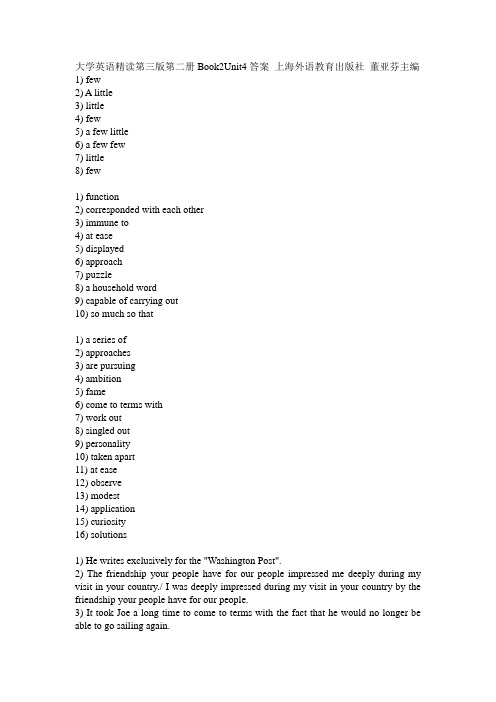
大学英语精读第三版第二册Book2Unit4答案上海外语教育出版社董亚芬主编1) few2) A little3) little4) few5) a few little6) a few few7) little8) few1) function2) corresponded with each other3) immune to4) at ease5) displayed6) approach7) puzzle8) a household word9) capable of carrying out10) so much so that1) a series of2) approaches3) are pursuing4) ambition5) fame6) come to terms with7) work out8) singled out9) personality10) taken apart11) at ease12) observe13) modest14) application15) curiosity16) solutions1) He writes exclusively for the "Washington Post".2) The friendship your people have for our people impressed me deeply during my visit in your country./ I was deeply impressed during my visit in your country by the friendship your people have for our people.3) It took Joe a long time to come to terms with the fact that he would no longer be able to go sailing again.4) Jim's grandfather believes more in fresh air and exercise than in medicine.5) Owing to his poor education he was frustrated in his attempt to find a good job.6) Most American cities are relatively small in terms of population when compared to Chinese cities like Shanghai and Beijing.1) emotional2) angry3) atomic4) exclusive5) famous6) jealous7) safe8) simple9) important10) valuable11) central12) delightful/delighted13) feasible14) fortunate15) personal16) capable17) sandy18) original19) curious20) easy1) typewriter2) honeymoon3) airport4) schoolmaster5) necklace6) eyesight7) loudspeaker8) sunrise9) heartbeat10) blood-test11) motorcycle12) crossroad13) spaceship14) superpower15) lifeboat16) rainstorm1) handbook/handmade/handsaw/handshake/handwork/handwriting2) housebreaker/housekeep/housekeeper/house arrest/housemate/housework3) workbook/workday/workmate/workshop/worksite/worktable4) bookkeeper/bookmark/book review/bookseller/bookshelf/bookstall5) riverside/roadside/bedside/dockside/inside/outside6) classroom/living room/reading room/waiting room/consulting room/dark room1) a drop of blood2) a grain of wheat3) a length of rope4) a lump of sugar5) a ball of string6) a block of marble7) a roll of toilet paper8) a helping of pie9) a blanket of heavy mist10) a slice of beef1) Joe's father was seen to return after dark.2) The wind was heard to roar through the trees.3) I don't think Tom can be made to take the boss's orders.4) The young man was seen to enter the building next to the bank.5) When she was in Shanghai the actress was heard to say she had long thought of this city as her second home.6) After the minister of education had finished speaking at the press conference, he was made to answer all sorts of questions.1) The doctor advised (that) Mike (should) stay in hospital until he was fully recovered.2) Cathy's father insisted (that) she (should) take a two-week rest before going back to work.3) The chairman of the Trade Union suggested (that) a special committee (should) be set up to look into the problem./ The chairman of the Trade Union suggested (that) they set up a special committee to look into the problem.4) The commander ordered (that) our company (should) start the attack before dawn.5) Knowing Jack to be dishonest, I demanded (that) he (should) tell me nothing but the truth.6) The dean of the philosophy department requested (that) the visiting scholar (should) give a lecture on Sartre.1) bewildered2) impressed3) modest4) profound5) displayed6) ambition7) singled out8) puzzle9) capable10) at ease1) by2) with3) listened4) gave5) told6) lecture7) sure8) Why9) for10) agreed11) two12) hall13) before14) place15) began16) single17) success18) people19) shaking20) followed21) before22) stopped23) a24) listened25) not26) nodded27) did28) thought29) but30) order31) was32) answer1) childhood2) a slow start3) mathematics4) grew up5) devote himself to research6) world-famous7) explain8) you think it's two hours9) the physical world10) conquer翻译1) 那小女孩跑得太快,身体一下失去平衡,跌倒了。
大学英语精读第三版第二册U4最完整答案
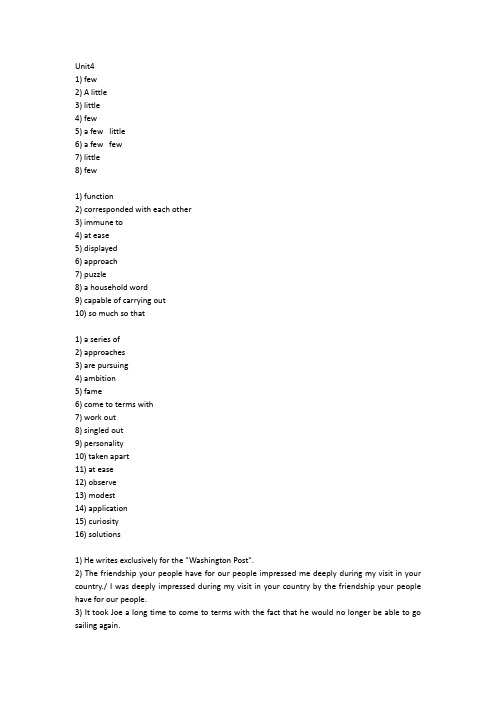
Unit41) few2) A little3) little4) few5) a few little6) a few few7) little8) few1) function2) corresponded with each other3) immune to4) at ease5) displayed6) approach7) puzzle8) a household word9) capable of carrying out10) so much so that1) a series of2) approaches3) are pursuing4) ambition5) fame6) come to terms with7) work out8) singled out9) personality10) taken apart11) at ease12) observe13) modest14) application15) curiosity16) solutions1) He writes exclusively for the "Washington Post".2) The friendship your people have for our people impressed me deeply during my visit in your country./ I was deeply impressed during my visit in your country by the friendship your people have for our people.3) It took Joe a long time to come to terms with the fact that he would no longer be able to go sailing again.4) Jim's grandfather believes more in fresh air and exercise than in medicine.5) Owing to his poor education he was frustrated in his attempt to find a good job.6) Most American cities are relatively small in terms of population when compared to Chinese cities like Shanghai and Beijing.1) emotional2) angry3) atomic4) exclusive5) famous6) jealous7) safe8) simple9) important10) valuable11) central12) delightful/delighted13) feasible14) fortunate15) personal16) capable17) sandy18) original19) curious20) easy1) typewriter2) honeymoon3) airport4) schoolmaster5) necklace6) eyesight7) loudspeaker8) sunrise9) heartbeat10) blood-test11) motorcycle12) crossroad13) spaceship14) superpower15) lifeboat16) rainstorm1) handbook/handmade/handsaw/handshake/handwork/handwriting2) housebreaker/housekeep/housekeeper/house arrest/housemate/housework3) workbook/workday/workmate/workshop/worksite/worktable4) bookkeeper/bookmark/book review/bookseller/bookshelf/bookstall5) riverside/roadside/bedside/dockside/inside/outside6) classroom/living room/reading room/waiting room/consulting room/dark room1) a drop of blood2) a grain of wheat3) a length of rope4) a lump of sugar5) a ball of string6) a block of marble7) a roll of toilet paper8) a helping of pie9) a blanket of heavy mist10) a slice of beef1) Joe's father was seen to return after dark.2) The wind was heard to roar through the trees.3) I don't think Tom can be made to take the boss's orders.4) The young man was seen to enter the building next to the bank.5) When she was in Shanghai the actress was heard to say she had long thought of this city as her second home.6) After the minister of education had finished speaking at the press conference, he was made to answer all sorts of questions.1) The doctor advised (that) Mike (should) stay in hospital until he was fully recovered.2) Cathy's father insisted (that) she (should) take a two-week rest before going back to work.3) The chairman of the Trade Union suggested (that) a special committee (should) be set up to look into the problem./ The chairman of the Trade Union suggested (that) they set up a special committee to look into the problem.4) The commander ordered (that) our company (should) start the attack before dawn.5) Knowing Jack to be dishonest, I demanded (that) he (should) tell me nothing but the truth.6) The dean of the philosophy department requested (that) the visiting scholar (should) give a lecture on Sartre.1) bewildered2) impressed3) modest4) profound5) displayed6) ambition7) singled out8) puzzle9) capable10) at ease1) by2) with3) listened4) gave5) told6) lecture7) sure8) Why9) for10) agreed11) two12) hall13) before14) place15) began16) single17) success18) people19) shaking20) followed21) before22) stopped23) a24) listened25) not26) nodded27) did28) thought29) but30) order31) was32) answer1) childhood2) a slow start3) mathematics4) grew up5) devote himself to research6) world-famous7) explain8) you think it's two hours9) the physical world10) conquer翻译1) 那小女孩跑得太快,身体一下失去平衡,跌倒了。
大学英语精读(第三版)第2册 第 4 课教案(DOC)
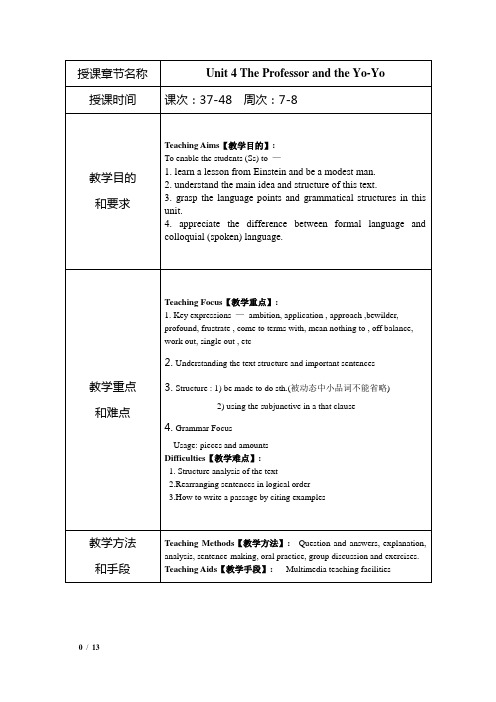
3)What do you know about the life of Einstein?
4)Do you think Einstein was responsible for the search work on the atomic bomb? Why?
After World War I, Einstein’s fame extended beyond the scientific community and in 1921 he was awarded the Nobel Prize for physics. During the 1920s he regarded the rise of the Nazis inGermanywith horror, eventually emigrating to theU.S.where, in 1933, he took up a post atPrincetonUniversity. In 1939 his early warnings of German scientific attempts to make an atomic bomb prompted the start of the Manhattan Project.
4)Woolworth’s
Frank Winfield Woolworth (1852~1919), an American merchant, was born in Rodman,New York. He established in1879 afive-cent store atUtica,New York, which failed, and the same year he started a successful five-and-ten-cent store atLancaster,Pennsylvania. Woolworth opened many others and soon extended business throughout theUnited Statesand to several foreign countries. In 1911 the F. W. Woolworth Company was incorporated with ownership of over 1,000 five-and-tens, and he became director of various financial firms. (The last Woolworth stores were closed in 1998.) Woolworth had theWoolworthBuildingerected inNew York Cityin 1913, the highest building in the world (792 ft/241.4 m) at that time.
新视野大学英语第三版读写教程第二册Unit4

Online dating
精品课件
Pre-reading activities
Watch and talk
Watch the MV Love Story sung by Taylor Swift and discuss the following questions.
1. What love story does Taylor
精品课件
Pre-reading activities
Compound dictation
Listen to a short passage concerning American dating and fill in the missing information.
Casual dating
精品课件
Lead-in
Look at the pictures and discuss
Formal dating
精品课件
Lead-in
Look at the pictures and discuss
Speed dating
精品课件
Lead-in
Look at the pictures and discuss
Lead-in Pre-reading activities
Cultural background
精品课件
Lead-in
Look at the pictures and discuss
Look at the following pictures and discuss what are the modern dating practices.
• Love sometimes is difficult, but as long as we persist and fight for it, we will end up with a happy life.
- 1、下载文档前请自行甄别文档内容的完整性,平台不提供额外的编辑、内容补充、找答案等附加服务。
- 2、"仅部分预览"的文档,不可在线预览部分如存在完整性等问题,可反馈申请退款(可完整预览的文档不适用该条件!)。
- 3、如文档侵犯您的权益,请联系客服反馈,我们会尽快为您处理(人工客服工作时间:9:00-18:30)。
Unit 4 The Professor and the Yo-YoTeaching Time: 8 hoursStudents’ level: non-English majors of the second semester of the 1st year.Teaching Objectives:1. Make students have an idea about the Einstein’s unusual personality whether as a scientist or as an average man.1). Analyze the personal characteristics of Einstein.2). Understand the way of life of Einstein.2. About the text, Ss should grasp the text content, text structure, basic vocabularies and required grammar points of the section.Words: ambition, application, approach, argue, bewilder, capable, correspond, display, exclusively, mainly, fortune, function,immune, impress, modest, observe, present, profound, pursue,puzzle, relatively, seriesPhrases & Expressions: at ease, off balance, come to terms with, as far as, mean nothing to, believe in, so much so that, a series of,take apart, work out, capable of, single outGrammar: be made to, that clause3.About the reading, Ss should acquire the skill—reading beyond lines.4.About the writing, Ss should get to know the paragraph developing —writing in logical order.5.About the listening, Ss finish Unit 4 directed by the teacher. Teaching Procedures:I.Pre-reading Activities1.Background information: Einstein & his achievementsIntroductory remarks: Einstein is one of the greatest scientists of all time. His ideas and theories have, directly or indirectly, influenced many areas of the modern world ——science, art, and philosophy. In spite of his great achievements and fame, he always remained a simple man: he was honest and open, very easy to get along with; he lived a plain life and had simple habits, caring very little for material well-being. And the text The Professor and the Yo-Yo, whose author is the son of a close friend of Einstein’s, sheds more light on Einstein’s personality both as a scientist and as a man.2.Key words and expressions:1). modest:a. having, showing, not a too high opinion of one’s merits, abilities, etc. For example:Asian women are more modest and shy, yet they tend to have an inner force.b. moderate; not large in size or amount- For example:The police came to suspect the man who lived a luxurious life on a modest income.2). balance:Useful phrases: keep one's balance; lose one s balance: be in balance; be out of balance; off balance.Special attention: “in the balance”, means 'undecided'. For example: Though her life was in the balance, she thought only of the safety of her fellows.3)impress:a) have a strong effect on the mind or feeling of. For example:I was deeply impressed by the scenery there.He impressed me as a modest scholar.My parents impress on me the importance of honesty time and again. b) fix (sth.) deeply or firmly on the mind or memoryE.g. His words were strongly impressed on my memory.4)immune:be immune to: be free from or unaffected by. For example: Vaccination makes people immune to smallpox.It seems to me that few people are immune to vanity or jealousy.5)exclusively:only; completely. For example:Eton college is an exclusively male public school in Britain.The report is written exclusively for the country's top leaders.6). pursue:v. a) follow, go on steadily with (study or other activity)E.g. He consistently pursued his task no matter how bad the situation was.b) follow in order to catch or do harm toE.g. The policeman pursued the thief.c) <derivative> pursuit (n.)E.g. We work hard in pursuit of happiness.7) displaya) (v.) showE.g. It is fashion designer's dream to display their dresses in Paris.b) (n.) displaying, show or exhibitionE.g. Are you interested in anything on display, sir?8) functiona) (v.) workE.g. The government functions through various ministries.b) (n.) special activity or purpose of a person or thingE.g. As one grows older, there is usually something wrong with body functions.9) frustrate :vt. a) cause (sb.) to have feeling of annoyed, upset disappointment E.g. Staying at home all day frustrated her because she had been a brilliant scientist before her marriage.b) make (plan, effort etc) useless, defeatE.g. The bad weather frustrated all our hopes of going out.10) bitter :adj. a) filled with anger or hatredE.g. You shouldn't have said those bitter remarks about him.b) having a sharp unpleasant taste, causing sorryE.g. They have learned a bitter lesson in the accident.c) <derivative> bitterness (n.)11) arguea) (vt.) try to prove sth. by giving reasons, maintain by reasoningE.g. Columbus argued that the world was round.b) (vi.) (for or against) give reasons for or against sth., (over / against) discussE.g. In the debate, one team argued for political reform, the other team argued against it.12) approacha) (n.) method of doing sth.E.g. Writers take a more romantic approach to the historic event than historians.b) (n.) way, pathE.g. All approaches to the park were blocked after the explosion.c) (n.) coming near toE.g. The pop star is easy of approach.d) (v.) come nearE.g. As night approaches, nightingales start to singing.13) fortune :n. a) luck, chanceE.g. He decided to try his fortune here.b) a large sum of moneyE.g. He has made a fortune by hard work.14). at ease:free from worry or nervousness; comfortable. For example:The doctor soon made the worried patient feel at ease.Donald was not at ease (or ill at case) at such a big party.<related phrases> set / put sb. at ease; make sb. feel at ease; with ease;E.g. The teacher has a good way to put his nervous students at ease.The doctor soon made the worried patient at ease.He solved the problem with ease.15). come to terms with:accept (sth. usually disagreeable) as it is; reach an agreement with.It has taken me a long time to come to terms with the fact that I’ll never be a good writer.It seems that the two sides will never come to terms (with each other).We have come to terms with them that the meeting will be delayed until next month.Later she had to come to terms with the difficult situation.16)as far as:to the extent that. For example:As far as I know he will be away for three months.He will help you as far as he can.17) so much so that:to such an extent that; so that…For example:He longed to visit Paris, so much so that he often dreamed about it.I was worn out, so much so that I thought I would never recover.18) single out:separate or choose from a group for special treatment or notice.All of us did a very good job but the teacher singled out for praise.It is an honour for him to have been singled out to represent the school at the celebration ceremony.20)point out :draw attention to, explainE.g. It was pointed out to us that it was getting very late.21) off balancea) not in balance, not bale to keep from turning over or fallingE.g. Don't rock the boat, you will throw it off balance and get it turnedover.b) <related phrases> keep one's balance; lose one's balance;22) work outa) solve, find by calculationE.g. It didn't take her much time to work out that she would soon have no money left.b) produce by thinkingE.g. We have worked out a scheme which should save the company several pounds a year.23) correspond with :exchange letters withE.g. Will you correspond with me while I am away?24) mean nothing / every thing to :be of no / great importance or value toE.g. Material things meant nothing to Einstein, but to some people they mean everything.25) revert to :go back toE.g. My thought reverted to my childhood days.26) take apart :separate sth. into partsE.g. The professor spent the whole afternoon taking apart his old car.Ⅱ. While-reading Activities1.Ss have the silent reading on the text (10 mins)2.T explains the text in detail.Lines 1--91. Language Points…I display my few tricks and pointed out to him that the incorrectly looped string had thrown the toy off balance. = …I showed of my skills of handling the Yo-yo and explained to him that the toy had turned over instead of rolling up the string because it had not been looped in a proper way.2. Questions for Discussion(1) What do you think are some of the way to make a shy young visitor feel at ease?---Being friendly and hospitable, offering sth. to play with, choosing a topic he or she is interested in, telling a joke, offering him or her chance to show off, etc.(2) From this example do you know what kind of person Einstein was?---He was kind, considerate, interested in children.(3) How do you understand Einstein's nodding?---He was not upset about the fact that the young man pointed out his wrong way of playing, He was modest and easy to get along with.(4) Do you think that daily matter show a person's character?Lines 10--161. Language Pointsthe personality that was Einstein = the personality which was the most striking characteristic of Einstein.a) <additional example> the military genius that was NapoleonHe was the only person O knew who had come to terms with himself and the world around him. = Of all the persons I knew he was the only one who was at peace with himself and the outside world because he accepted the world as it was and knew his limits as a human being.He knew there were answers beyond his intellectual reach. = He knew that the universe had more mysteries than he ever hope to solve, great as his intellectual capabilities were.He was content to go as far as he could. = He was satisfied with what he could achieve and would desire nothing beyond his reach.2. Questions for Discussion(1) Do you know how personality is formed?---It depends on many factors, e.g. genetic background, education, living surroundings, influential persons, etc.(2) What does " he had come to terms with the would around him" mean?---He accepted the world as it was and didn't fight against things he couldn't change.(3) What does "be content to go as far as one could " mean?---Work hard and go as far as one can, be satisfied with what one could achieve. This is a philosophy of life.Lines 17--211. Language PointsHe was beyond any pretension. = He was completely sincere and honest without the slightest intention to show off.2. Questions for Discussion(1) Do you know why he was free from these emotions?---He had come to terms with himself and the world around him. He was interested only in his work, and not in these worldly distractions.(2) How do you know that he was a great person who disliked showing off. He used inexpensive stationary to write to people of high rank, without feeling ashamed.Lines 22--341. Language PointsMaterial things meant nothing to him. = Material things were of no important to him.The razor and water do the job. = The razor and water will do.2. Questions for Discussion(1) Do material things mean nothing to you? What's your point of view? ---Material things include necessities of life. In this sense, they meanmuch to most human beings. They also depend on people's concept of value as we discussed earlier.(2) What does it mean when a person shrugs?---It may mean "I don't care", "It doesn't matter". "I don't believe", "I can't do it", "I won't do it" and so on.(3) Why did he revert to using plain water to shave after finishing the shaving cream?---He accepted the tube of cream as a gift and used it, but wouldn't go out and buy one for himself.Lines 35--521. Language PointsHe didn't have the slightest interest in the practical application…a) not…the slightest : not…any; noE.g. He didn't feel the slightest pain when the needle went into hie wrist....that's not it. = That's not right. / That's not what is expected. 2. Questions for Discussion(1) What does "his quick expression of disapproval" tell us here?---He wanted to know things by reasoning. He believed and was interested only in theory and he refused to take short cuts.(2) What do you think of the example?---He was sort of stubborn, impractical, odd, unique and true to his ideas.Lines 53--611. Language PointsHis name was a household world. = His name was well-known to everyone.2. Questions for Discussion(1) His theories were capable of exciting relatively few scientists. Why do you think his name was a household word?---The significance of a theory lies in its real value. Although average people didn't understand his theories, they owed many useful things to his contributions, such as TV. His ideas were put to practical uses. Above all, his ideas created a revolution in science that excited even people who were not scientists.(2) How do you understand what he said about his achievement? Why was he bewildered about people's admiration?---He was very modest. He regarded himself as an ordinary man. He thought he had done no more than many other men.Language Points:make sb. feel at ease; when my turn came; throw sth. off balance. Questions:a.From this example do you know what kind of person Einstein was?b.How do you understand Einstein's nodding?Paragraph Two:Language Points:a.the personality that was Einstein: the personality which was the most striking characteristic of Einstein.b.He was the only person I knew who had come to terms with himself and the world around him: Of all the persons I knew he was the only one who was at peace with himself and the outside world because he accepted the world as it was and knew his limits as a human being.c.He knew there were answers beyond his intellectual reach: He knew that the universe had more mysteries than he could ever hope to solve, great as his intellectual abilities were.Questions:a.What does 4% he had come to terms with himself and the world around him" mean?b.What does "be content to go as far as one could^ mean? (be satisfied with what one could achieve-)Paragraph Three:Language Point:He was beyond any pretension: He was completely sincere and honest without the slightest intention to show off.Questions:a.Why he was free from these emotions?b.How do you know that he was a great person who disliked showing off?Paragraph Four, Five and Six:Language Points:a.Material things meant nothing to him: material things are of no importance to him.b.finally: at last For example:The detective finally tracked down the suspect.c.present sb. with sth.; a tube of (cream, toothpaste, etc.)d.revert to : go back to (a former condition or habit). For example:The stress lie felt made him revert to the old habit of smoking. Questions:a.Do material things mean nothing to you? What’s your point of view?b.Why did Einstein shrug? What does it mean when a person shrug?c.Why did he revert to using plain water to shave after finishing the shaving cream?Paragraph Seven, Eight and Nine:Language Points:a.E=mc2: Einstein’s special theory of relativity proposes,among other things, that the maximum speed possible in the universe is that of light; that mass appears to increase with speed; that the rate of a clock moving through space will decrease as its speed increases; and that energy andmass are equal and interchangeable. The last point was expressed in the famous formula E=mc2 (energy equals mass times the square of speed of light) and was later proved by atomic fission.b.have curiosity in doing sth.c.take apart: separate (sth.) into parts. For example:Nick took apart the dock and spread the bits all over the carpet.d.work out: solve; find the answer to. For example:John worked out the math problems all by himself.Questions:a.What did Einstein think of his photoelectric theory? Did it prove to be of any practical value?b. What does “his quick expression of disapproval” tell us here?c. From this example, what kind of people was Einstein?(He was sort of stubborn,impractical,odd, unique and true to his ideas.) Paragraph Ten:Language Points:a.profound: deep; needing much thought or study to understand. For example: Philosophy is profound and beyond the reach of ordinary people.b.capable of: having the ability or power for: for example:He is capable of doing such a difficult job.Some airplanes are capable of going beyond 1,000 miles an hour.c. a household word: word known far and wide.Questions:a.His theories were capable of exciting relatively few scientists. Why do you think his name was a household word?b.How do you understand what he said about his achievement? Why was he bewildered about people’s admiration?3. T asks Ss to come out the main idea, structure of the text (10 mins)4. T summarizes the main idea and structure of the text (5 mins)Ⅲ. Summary Questions and Concluding RemarksSummary Questions1. What do you think of Einstein? Can you tell why he is so respected?---He was one of the greatest scientists in history. He created a revolution in science.2. Can you sum up his personality and life style?---(1) Einstein was a modest man.a) When the boy pointed out his mistake in playing with the toy Yo-yo, he nodded.b) When he received great attention, he thought he was fortunate rather than deserving.---(2) He was a man without personal ambition.a) He had come to terms with himself and the world around him.b) He wanted only to understand the universe within his intellectualreach.c) He was content to go as far as he could .d) He was never seen to show personal ambition.e) He cared little for fame.---(3) He believed in simplicity.a) He used inexpensive stationary to correspond with the world most important people.b) He used only a safety razor and water to shave.---(4) He was purely and exclusively a theorist.a) He wouldn't walk down a street to se a reactor create atomic energy.b) He didn't have the slightest interest in observing how his theory made TV possible.c) He would rather give up than use a practical approach to discover the operating principle of the toy bird.Concluding Remarks---As a scientist, Einstein was so great, so extraordinary and distinguished but as a man, he was modest, simple and ordinary. After studying the text, we can learn a lot from him both as a scientist and as a man..Ⅳ. Post-reading Activities1.Let the students do the exercises in the textbook which arc related to the new words.2.Ss hand in the summary of the text.3.Ss discuss the questions on the topic related to the text.4.Let Ss do the exercises in the text book which are mainly related to the new words and topic.。
